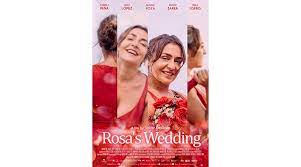
ROSA’S WEDDING/ LA BODA DE ROSA
Spain, 2020, 97 minutes, Colour.
Candela Peña, Sergi Lopez, Nathalie Posa, Paula Usero, Ramon Barea.
Directed by Iciar Bollain.
Rosa (Candela Pena) is seen running in a marathon through the city of Valencia, urged on by all and sundry, everybody seeming to know her and encouraging her – running until she collapses out in an open field. Real? A dream? In fact, Rosa is 45 years old, no husband, a daughter with twins, a successful and skilful dressmaker, with this prospect for the rest of her life.
At this stage, to test how one might enjoy the rest of the film, the audience should ask itself the question: are you the type of person that imposes on everyone else or are you the type of person that everyone else imposes on? Yes, Rosa is completely imposed on, her widowed father, still grieving, but not accepting his wife’s death wants to move in with her. Her brother, Armando (veteran Sergi Lopez) runs a school but it is not successful, especially in money matters, has clashed with his wife who wants to divorce him. He is always phoning Rosa to come and put his children to bed. Her sister, Violeta (Nathalie Poza), speaking three languages, is employed as a translator at conferences has a drinking problem. And, she worries about her daughter, Lydia, who has moved to Manchester, has given up her job. At work, there are continually extra work to be done, cloth to be chosen, alterations to dresses, last-minute emergencies…
Rosa visits the shop her mother ran, dressmaking, in the seaside town of Bencassim. And here she makes a decision, to reopen the shop, to make a new start.
For the rest of the film, the audience, in light of the initial answers to the question posed, will identify with Armando and Violeta, with Lydia and her frustrations, and decide, like them, that they have been far too demanding on Rosa, not acknowledging that she needs a life of her own. For those who identify with Rosa, empathising, possibly quite wearily, with how people make their demands on her, will appreciate that Rosa thinks it’s about time. She has to do something for herself.
She has made wedding dresses and the idea comes for a wedding. But the key is, as the trailer and the advertisements eagerly point out, she wants to marry herself. She wants a quiet ritual on the beach, an opportunity to commit herself to herself and to a constructive future.
Of course, it all gets out of hand. Armando wants to take over and organises the town hall, a band, a banquet. Her father invites all the cousins from Pamplona. Violeta, fired from her job because of her drinking, actually has a fine change of heart, listening to Rosa, discussing with her, realising how they have taken advantage of Rosa. And, her daughter, initially surprised, is also a means of reconciliation.
This is Spain. This is the land of colour and music. This is a land of exuberance. And, so, we might expect that there will be a wedding ceremony, on the sunny beach, and Rosa making a strong declaration about how she will be in the future, not neglecting her relatives and friends and her friend, Rafa, who is astonished at the news that she might be marrying another man. Rosa will help others, be an enabler, but she will be herself.
Individualism – not selfishly, but creatively.
- The? Expectations? A film from Valencia and the Mediterranean coast? Hard work, humdrum lives, but exuberance?
- The opening, Rosa and the marathon on, everybody cheering her on, her perseverance? Running on to the desert field? Dream? Reality? The reality of her life, at the factory, sewing, choosing cloth, alterations, the many demands? The background of her mother’s work and shop?
- The city of Valencia, the streets, homes, factories? The coast, the town, the surroundings? The musical score?
- Roses story, 45, no husband, her daughter with twins, anxious about her daughters career and job, her giving it up? Living in Manchester? Rosa and the impositions from her family, her brother asking her to go to his house to feed the children and put them to bed? Her sister and her busy professional life and translations? Her father, but coming to terms with his wife’s death, two years, wanting to move in, Rosa not wanting this, his having to go for tests at the hospital? The advice about his grief?
- Rosa, talking with her family, talking with her friend Laura on Zoom, RAFA as a boyfriend?
- Rosa, finally exasperated, the fuss with the dresses in the models, giving up her job? Going to the town, the old shop, wanting to restore it? Armando and his plans to sell the shop to finance his school? Violeta and her ownership? The discussions about finance?
- Roses decision to have the wedding, to marry herself? The plan, on the beach, quiet? Armando taking over, ordering the band, the banquet…? The T-shirts?
- Lydia, the scenes with her twins, phoning her mother, not understanding what was going on, the train trip? Eventually meeting her mother, her mother willing to sacrifice herself, Lydia returning to Valencia? Sorting out the issues between mother and daughter?
- Violeta, her translation work, drinking, being fired? Talking with Armando, his awareness of her drinking? The puzzle about the wedding, eventually talking with Rosa, heart-to-heart, sympathy?
- Rosa and the response to Armando’s organisation, hurrying to the town hall, the crowds, from the town, the relations from Pamplona…? Her telling everybody that it would be at the beach?
- At the beach, the crowds, her explanation, that puzzlement? Her explanation of her commitment to herself and to our future?
- The celebration, the band, dancing, Rosa in the red dress?
- A future? Audiences identifying with the put upon Rosa, her age, imposed obligations? Her being free – still helping but being herself?